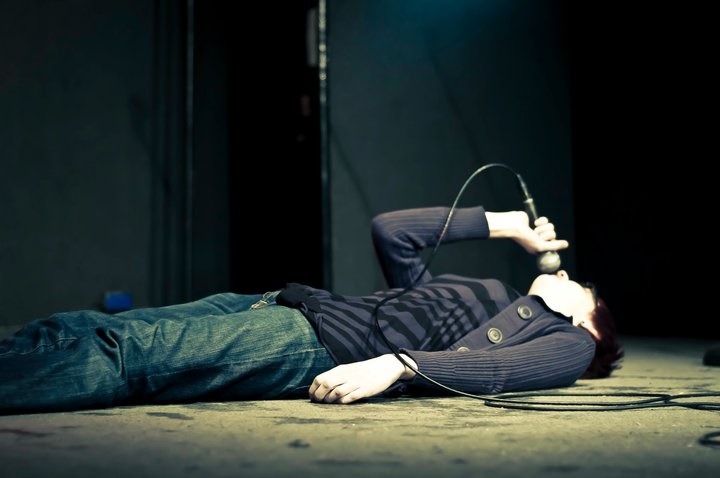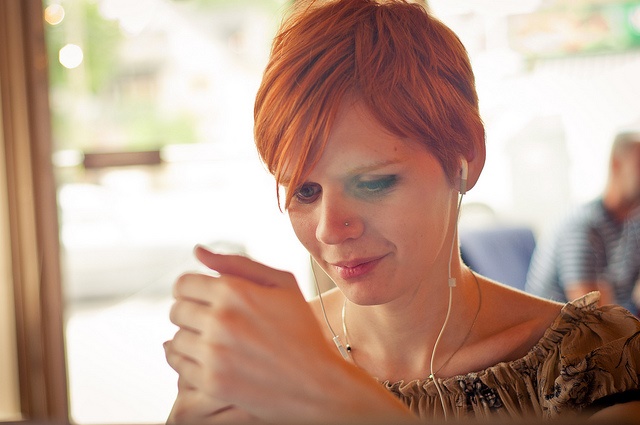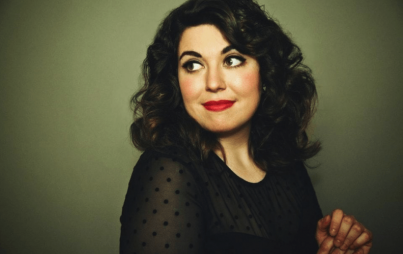
Community is not always a cluster of comforting faces where everyone knows your name—sometimes it is like a comet, a fleeting entanglement of emotion and affection that fills the gap preceding the lovetap of planetary bodies.
Avery Edison and I have but a Where’s Waldo postcard and a single Skype call to show for our year-long friendship, but she is every much a part of my community as the women I’ve marched with and share awkward post-hangover breakfasts in Chinese buffets.
Her comedy reached through a decade of radio silence to remind me that I was not alone—despite the ever-mounting trumped-up evidence of society’s case otherwise.
Art imitates the smallest branch of the tree of life you can cut down—otherwise there’d be a different reality show about a polyamorous dyke trans girl struggling to decide which side of her head to shave, every night of the week.
When she told me I could call her by her informal moniker “Aves” I was so shy and embarrassed I didn’t write her back for, like, a week. It’s always a little humiliating when someone you admire thinks you’re a person.
The soul-soothing solace that knowing Avery provided me with culminated in my languished exodus from tech. When Avery was detained in Toronto, placed in a men’s holding facility—I took the day off work. I made mental camp at the #FreeAvery hashtag, and amidst the frantic firestorm in my head, it occurred to me that it was time to cut myself free.
I had been a kept girl for a long time, shielded from the real struggles of other trans women—women whose voices and visibility were essential to that solace. I had a steady income. I paid for taxis when I overlsept. I smoked inside to protest the quality of our day’s catered lunch. There was a lot of work that needed doin’ to support my community—I was only biding time for myself.
So I quit and moved to Oakland, and now I get to ask one of my heroes borderline-snoopy questions about her identity and career! It’s the Non-National Denominational Dream!
We’ve both come a long way since then, and even since I first invited her to be interviewed for Ravishly two months ago. A lot of things have happened for queer and trans folk, good and bad, in those two months—these are questions put forth by a younger me, received by Avery and given back to a (slightly) older and more experienced me, hoping to honor the space and friendship of someone who, albeit unknowingly, has inspired a dramatic overhaul of my life and work.
All that I have and all that I am is due to the grace, patience and brilliance of other women in my life.
Avery Edison is one of those women.
So read the thing.
How did you get into comedy, and how/when did you decide to start incorporating your experiences as a trans woman into the material?
I started doing stand-up in 2007, as part of a degree in Comedy Writing and Performance at Southampton Solent University (which is barely a real university, and I was barely a real student). At first, I was doing standard observational stuff about movies and TV shows, but as I began exploring my gender identity off-stage, it started creeping into my on-stage work as well.
I started cross-dressing on stage, and it was just accepted as a performance choice (in no small part thanks to the success of Eddie Izzard). So I got to experiment with my identity in public in what was a pretty safe space (although not entirely safe, as I learned when I tossed one of my fake breasts into the audience to illustrate a joke, and it was then thrown back at my head).
Obviously the audience would be a little confused about my appearance, so my (terrible) jokes about Battlestar Galactica and Ratatouillehad to give way to discussing just why a dude was dressed up as a girl, and I ended up expanding from there. Since then, I’ve mostly focused on my personal life as the basis for my comedy, particularly my gender identity and experiences as a trans woman.
“Write what you know,” right?
A lot of your humor seems to revel in your audience’s confusion and not quite being able to relate to your experiences. How do you gauge a successful joke/routine when you perform outside the standard “set it up, knock it down”?
Whether I address it or not, the audience is going to have a certain distance from the stuff I’m talking about due to the unusual subject matter, so I like to at least have fun with that obstacle, and perhaps do interesting things with the form (which sounds pretentious to write, because it is, and I am).
I still do traditional “set-up, punchline” jokes, but I take a little longer than another comedian would spend executing them. There are lines in my act that I can point to and say, “This is a standard joke, and it will get a standard one- or two-second laugh.” But the big laughs, the ones I crave, always come from unexpected parts of the routine. Sometimes it’ll be a pause between words in an otherwise boring sentence, or a slight frown I make at my own joke. Those laughs are unpredictable, and they’re what I judge my performance on.
A lot of the tics of my performance style—the long silences, the slow delivery—are a way of controlling the crowd. I’m a vain performer, and I want absolute attention.
When I come on stage and stand there, silent, and take my time very purposefully getting ready, I’m trying to set an expectation. The difference between a show going well or going badly lies in how well I do that.
Watching you struggle with a notebook tied to your finger, as an audience member, would make me afraid—for you, and of performing. Are you conscious of the way you engage the fears of the audience, and does it offer you any catharsis?
I’ve never considered that the audience might be afraid for me! Especially with that particular set, which wasn’t planned at all. I had a pretty standard routine ready to go, written down in that notebook, but was fiddling with the string before I went on stage and thought, “Oh, I could pretend it got stuck.” I scrapped the planned act and wrote the new one in my head during the walk to the stage, and just went with it. So I never had time to consider any reaction other than laughter. I just assumed everyone would know it was pretend.
With hindsight, I can see why that act would be a cause for concern. Even though the video is displayed next to more controlled sets that I’ve done, people have wondered just how “real” that onstage breakdown was.
It’s always interesting to me to take my comedy to a difficult place and pull it back from the brink. So much of comedy is about tension, and that set was clearly very tense for the audience. If nothing else, it was memorable! But I got some laughs, too.
Your comedy speaks to a lot of people in your community. Is it strange having fans who are also friends, or is this more normal than I’m imagining?
I love having fans who are friends! I heartily recommend it to everyone, because 1) it means that your friends respect your creative work, and b) it means your fans like you as a person, in addition to enjoying said work. It’s win-win!
It’s common in comedy. Most of the comedians I admire are friends of mine, which makes sense, because I choose to become friends with someone based largely on their sense of humor, and that’s the same reason I become a fan of a comedian!
In the past it was much harder to become friends with someone you were a fan of, especially if they were famous, or semi-famous (neither of which I consider myself to be), but now with social media (something the kids are using, and which I predict will be very big) it’s so easy to communicate with an artist and become pals. That’s great! More friendship in the world is wonderful!
Do you think your on-stage vulnerability would translate well to an untraditional venue? Have you ever wanted to tell jokes at a zoo?
It has never occurred to me to tell jokes at a zoo! I’m not sure how well I would do in a venue other than a comedy club or theater.
To go back to what I said about setting expectations, I think a lot of my act relies on the assumptions an audience enters with, and to disrupt that would jeopardize how well my style would work.
My style is partly a comment on “traditional” comedy, and its tropes, so I need that context. It might be worth it to do a gig in a zoo, though, because I feel like chimpanzees would make a great audience (until they start to heckle).
You perform in jeans and a shirt, without any noticeably intricate makeup—which doesn’t seem strange to us, but when most imagine a “trans woman comedian” they probably imagine someone who presents a little differently, at least for public consumption. Is this a conscious decision to challenge people’s notions, or do you dress in what’s comfortable?
I’m a little hurt, because I usually think of myself as wearing a well put-together outfit! Whenever I leave the house I make an effort to have some sort of stylistic choice going on (usually just matching some colors, or making sure my earrings go with my shoes), so I’m surprised to learn that it comes across as me just performing in jeans and a shirt.
I just wear what I usually do, to be honest. I do my make-up a little fancier and maybe wear a heel if I’m not worrying that day about looking too tall, but other than that . . .
Women definitely have to meet a different standard when performing comedy (just like in every other profession). Men can turn up on stage with food stains, ill-fitting sweaters and flip-flops, and not be judged for their sartorial choices. 
Women have the added pressure of being funny and being attractive. And as a transgender woman, I feel even more pressure, because I never want to look like an “unconvincing” woman—not only because that can be triggering for me from a dysphoria perspective, but also because the style of my act requires a lot of respect from the audience.
I don’t think that any transgender women should feel they have to look like a “real woman” (whatever that means), but current societal standards mean that if you try to present as what most people expect of a woman, but do so unconvincingly, you are an object of ridicule.
It’s the classic man-in-a-dress trope. It’s hard to get a room to laugh at your jokes when they’re already laughing at your outfit.
I know I, personally, have described your comedy as “healing”. Am I the only one, do you personally find it healing for yourself, and how do you handle people on the Internet telling you your comedy takes their pain away?
It’s incredibly flattering when people express those sentiments to me. I’m often self-deprecatory about my “silly little jokes,” but they come from a very raw emotional place. The things I talk about—like a death in my family, my experience with a physical assault and my gender identity disorder—are difficult to live with, let alone discuss.
I know that in working on material I’ve healed myself by re-examining how I feel and think about certain issues in a comedic context.
For example, I have a bit about doing ridiculous, outsize gender performances in a restroom to make other women comfortable. Using a restroom marked “women” used to cause me a lot of anxiety. I’m lucky enough to have some passing privilege, but I would still panic at the idea of being “caught” in the “wrong” toilet. But when I decided to use that as the basis for a joke, and thought about the things I did to make myself seem like more of a woman (like loudly grabbing a toilet roll despite not having a vagina to wipe), I got a clearer view of the ridiculousness of the situation.
And then I heightened it, with the onstage Avery Edison talking about loudly asking everyone in the bathroom about HPV, or complaining of having left a tampon in too long and getting toxic shock syndrome. I think the joke highlights—to both myself and the audience—a small aspect of gender being performative, and maybe helps deflate the standard that performance has to live up to.
Comedy can be fraught for a marginalized woman of any background/identity—how do you navigate choosing venues and the people you work with?
I was lucky, in Toronto, to have a wide community of friends in comedy who I met while attending the Comedy Writing and Performance program at Humber College. I knew that they were good people, and so when we performed in the city and talked to each other about shows, venues and other comedians, I was able to use that communication network to get a heads-up on any dicey situations.
I was also lucky to get the respect and friendship of some more established comedians on the scene—particularly the Laugh Sabbath crew, and especially Nick Flanagan—who could point me in the direction of safe places to do comedy, as well as book me on their own shows.
I’m always wary of performing in new places or with new colleagues, and I’m so glad that there are shows like Queer As Fuck, run by the wonderful Catherine McCormick, which provide a specifically LGBTQ-positive space for comedy.
Your humor magazine, Framed Egg, is wonderful. What’s the difference, in terms of time and energy, between writing jokes to say aloud and writing jokes meant to be read?
I’m glad you enjoy Framed Egg! I should really put out another issue, one of these days . . .
Writing humor for the page is so much harder for me than stand-up. With spoken comedy, there’s already a built-in and understood reason for what is happening—the audience has decided to attend this show because they know the person performing will be speaking directly to them and sharing their thoughts in a (hopefully) hilarious manner. But with humor writing, there’s no such expectation. Every piece has to justify itself, and establish its context straight away.
That’s why so much humor writing is epistolary, because you can create a context with two simple words: “Dear [blank]”.
After you start that way, the audience knows they’re reading a letter, and can relax into the piece knowing what to expect. They know the prose will be in first person, and directly addressing someone. They know how it will end, and that there are a few variables in play—formal or casual tone, friendly or confrontational message, etc.
When I first started writing humor, I went to McSweeney’s Internet Tendency and read through the archives, writing down the many ways to structure and present a piece: letter, list, article, story, play and so on. I still refer to that list if I have an idea but am not sure what format to use to get it across.

Do you feel an obligation, or rather, do you hold yourself accountable to make material out of your struggle? When something shitty happens do you, does a voice in your head go “fuck, now I have to make that into a joke”?
The only obligation I feel is to make myself laugh.
Every time I’ve written about something because I’ve felt like I should do so, it’s turned out feeling flat and lifeless. So if something happens to me and I don’t naturally come up with a funny take on it, I don’t force myself to power through.
I just wait for my brain to keep ticking over and maybe spit out a few jokes later. If it doesn’t, there’s plenty of other stuff for me to joke about.
A friend of mine, Nicklas, recently wrote something about me which I found incredibly flattering. “When she’s in the right frame of mind, she creates things seemingly without regard for if there’s an audience or not.” I’d not thought of myself or my work that way before, but now I aspire to live up to that compliment. Although I do enjoy creative constraints (I wouldn’t be so active on Twitter if I didn’t), I think the one constraint that isn’t healthy is feeling hemmed in by your audience. I bear in mind their expectations (I’m using that word a lot, because it’s very important to me), but I try not to let them control me.
If an idea makes me laugh, and I can find a way to express it, I will put that idea out into the world. I have confidence that there are people like me who will find it and enjoy it. And if not, the idea was too good for the world anyway, and I am a martyr to art (this is a joke. I do not wish to be a martyr, because that sounds hella painful).
This question is a free space. Say whatever you’d like here!
People should buy my book, Right Body, Wrong Junk! It’s a collection of sometimes-humorous, always-entertaining essays about my experiences as a transgender woman. It’s great!

![Photo credit: By Stand-Up Sucks, LLC - "I Am Comic" Directed by Jordan Brady and distributed by Monterey MediaLocated on Monterey Medias Flickr account. [1], CC BY-SA 3.0, https://commons.wikimedia.org/w/index.php?curid=14615036 Photo credit: By Stand-Up Sucks, LLC - "I Am Comic" Directed by Jordan Brady and distributed by Monterey MediaLocated on Monterey Medias Flickr account. [1], CC BY-SA 3.0, https://commons.wikimedia.org/w/index.php?curid=14615036](/sites/default/files/styles/profile/public/images/article/2019-06/1200px-Roseanne_barr.jpg?itok=icUN7jju)




